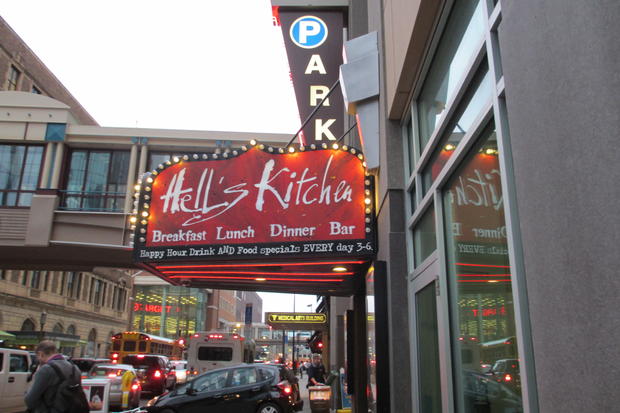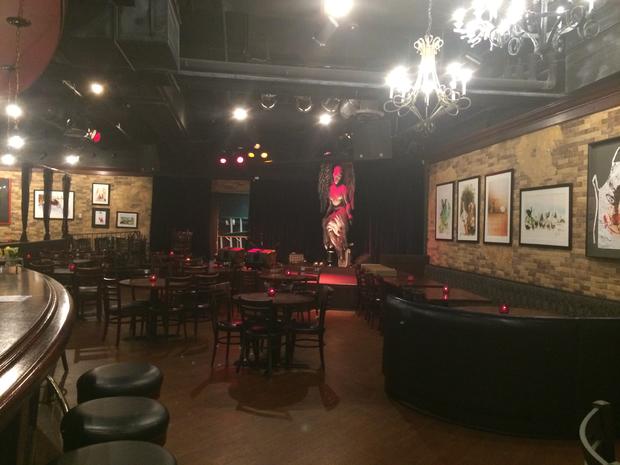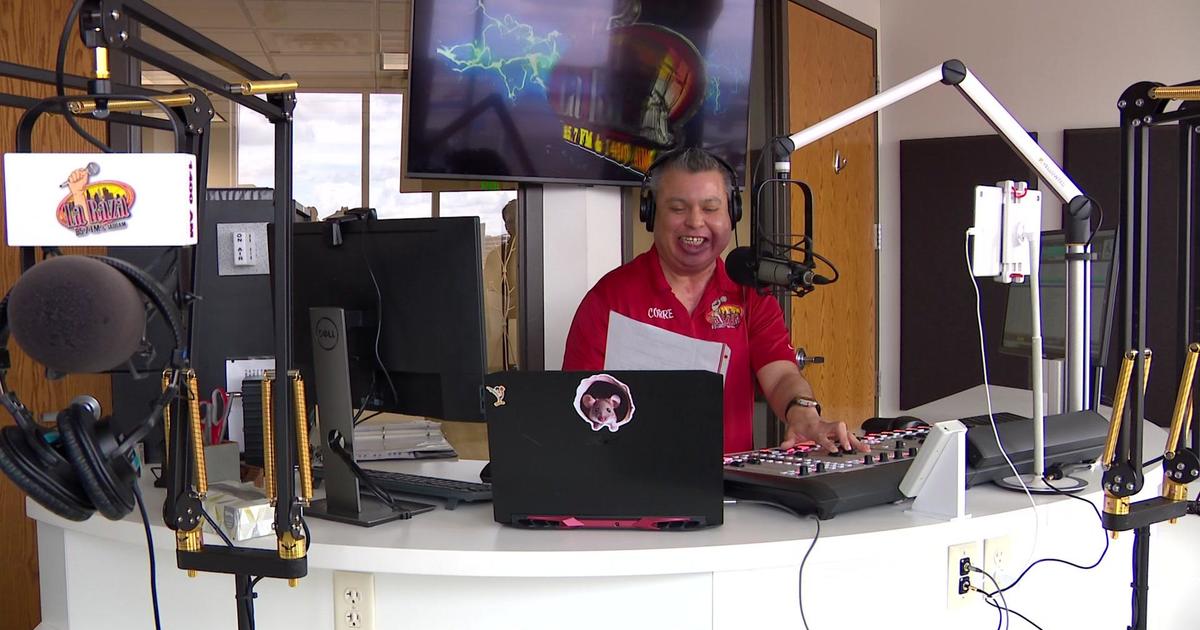Curiocity: Q&A With 'Musical Mondays' Creators
From the Ordway to the Guthrie to the Children's Theater Company, the Twin Cities has long had a thriving theater community.
And it is one that continues to grow.
But while these houses draw most of the attention, the Twin Cities theater community runs much vaster, and deeper, than them.
Numerous small theaters across the metro produce a handful of original shows every year, and the annual Minneapolis Fringe Festival now features hundreds of shows at almost 20 different venues each year.
Not to mention the open mics, improv events and cabarets that take place around town -- cabarets like Musical Mondays at Hell's Kitchen in Minneapolis.
There is a thirst for theater in the Twin Cities and there is a community that is proud to showcase their talents.
Musical Mondays pairs these two by offering audiences a taste of local performers, and offering local performers a space to explore their range of talent.
What started as a way to introduce family and friends to their 2012 Fringe Show, "Fruit Fly," has now grown into a staple at Minneapolis' Hell's Kitchen. Performers from around the metro, both established and up and coming, have taken the stage at this monthly cabaret.
So I sat down with the people who are working to make everyone's Monday a bit more musical, Max Wojtanowicz and Sheena Janson.
So, tell me a little bit about the show. How did it start?
Max: We [Sheena and Max] wrote our Fringe musical together, "Fruit Fly," in 2012 and…before the festival we wanted to put together a fundraiser cabaret somewhere. We weren't sure where, and our friend Whitney Rhodes was connected here [Hell's Kitchen], so we told her we were looking for a space and she said well you should try Hell's Kitchen. So we did it in June of that year. We did a set up where it was just a bunch of our friends singing some show tunes, or whatever they wanted, and then we previewed some songs from our show just to get our families and friends excited. And to raise some money. And then in the fall we came back and did another one to thank people who gave to our crowdsourcing campaign online.
Sheena: We got a lot of positive feedback from people who came to the first one asking, 'Are you guys doing this every month?' And we said no, but maybe we should talk about that! People were really excited to have another place to network aside from an audition room or in the lobby at a show. There was no pressure for people to sing if they didn't want to, and it just got interest right away. So we were like, maybe we should make this a monthly thing.
Is that how the relationship came to be with Hell's Kitchen?
Max: At the time the people at Hell's Kitchen had said they were opening up Mondays in that room to be a nonprofit sort of Monday night industry night. They asked us if we would like to do some kind of thing consistently, and so we said 'Yeah, let's give it a try.' So, they gave us a three month trial period for November, December and January. And right away it took off. I mean the first one we got 75 people probably. And it's just kept growing and it's been really consistent. So once they saw that, they were like great! You can just have that [the first Monday of every month].
How do you find, or choose, performers? How do people become involved?
Max: We have a rolling list of people who are interested, now. At first it was all people we knew but there were some [that we didn't]. Like I don't really know Michelle Barber, for example, who is playing Dolly in "Hello Dolly" at the Chan [Chanhassen Dinner Theater] right now. But I was like 'I bet she'd want to do this, maybe.' So, we just emailed her and now we're buddies. Also, I've met a bunch of people through this, actually. People who have come to the show and that have introduced themselves to us, because we sort of say, if you would like to perform and we don't know you come introduce yourself, get to know us. So that's been super fun.
Sheena: We've met a lot of singers through previous singers. A previous performer will say, 'Oh I had a great time. I was just in a show with A, B and C and they would love to do it.'
Max: And the more we had them, the more we heard from people. We kept hearing from people, 'How can I perform? How can I help? How can I do whatever?'
Cabarets can vary from venue to venue. How is your show set up?
Max: The basic structure of it is that it's a 90-ish minute set. It's six singers, five or six singers depending. And at first we were like, sing whatever you want. Those first couple of months we sort of did a free for all. What's in your book, what kind of duets can we put together, is there a group number we can find. And then as we went on, after a couple months, we were like why don't we try having a theme? So, we put themes on stuff -- Men's Night, Ladies' Night. We've done composer tributes to different [composers.] Like all Richard Rodgers or all Stephen Sondheim. We've done a Pride theme in June where it was gender-bender songs. We've done lots of different things.
Very cool! So, how are the songs chosen? What are the guidelines for performers?
Max: It should have been written for the stage, or in a musical, or a cabaret song or something like that. And we try to keep away from songs from shows that are going to be performed, or have just been performed, as a professional courtesy. Unless they are previewing it. And also, that makes us be a little bit more creative too, and helps us find new things. Some performers really want to sing something they have done before, some really want to find something new. It's been fun.
Sheena: And some want to do something that they would normally never do in a theater setting. Like a young girl could sing an older gentleman's song. Or two women could sing a love song together. Because we don't really have parameters like that. And I think it's important that we kind of challenge the singers to look outside the box if they can.
The show recently celebrated its second anniversary. How has the show changed within that time?
Sheena: I think the standard, or caliber, of talent that we've had has been growing. And we started writing like Facebook messages like 'Hey guys, these are just some things you should know about.' And now it's a newsletter.
Max: The letter is a lot longer.
Sheena: Like we really should not have done this that one time, and now we know not to do it again! We're learning.
Max: We're learning as we go. Like what kind of lands in that room and what doesn't. And what songs we want. Because it's not a theater, it's a little cabaret room, there's no set there's nothing to hide behind really. The songs sort of have to stand on their own. If they require too much set up, for example. That maybe we wouldn't have known right away. We sort of learned that over time. Like what things get a response. What kind of slows the evening down. We're still learning.
Sheena: We've also opened up to other instrumentalists. We used to have just piano, but now we try to have percussion every time.
Max: Maybe guitar and bass…
Sheena: We had [drums] once.
Max: Yeah, the first time we had drums we were like 'Oh this changes everything! We can't not have drums anymore.'
Awesome! It sounds like you have some really talented people perform, but there is no charge for the audience?
Max: It's all donation based, so people throw $5 in the hat. And [Hell's Kitchen] give us the room for free and they staff it for us with a technician and a bar staff, which is incredibly generous of them. They are so kind to us. But, we didn't really want to charge a ticket price because we felt like that would keep people away, even if it was cheap. So, now it's just a suggestion donation and all that money goes back towards the artists. So we don't actually make any money doing it.
Sheena: And for every $5 that you give, or if you give a donation, you get your name in a drawing for tickets for local theater.
Yes, I've noticed that you seem to have a relationship with theater houses across the metro as you've given away tickets to shows. How did that start? Is that something you do at each performance?
Max: It started, we just thought 'Wouldn't this be fun if we could try and get this?' And so, whoever I know at the Ordway I would just write to them.
Sheena: Or sometimes it will be singers who are in shows that will be like 'Hey I would love to promote the show I'm in. Would you mind saying something about the show?' And we're like, 'Yeah, great. Would you like to give some tickets too?'
Max: It's that way. Even theaters where I don't know anyone there will say 'Yeah, sure of course!' Because they always want butts in the seats too, you know? Even theaters that have multi-million dollar budgets. We've given tickets away to Children's Theater, Ordway, Chan. But then even really small theaters. And [the small theaters] obviously more inclined to give us tickets because they want to get their name out there. And then it's been fun to try and see what's going to open this month, so what's already in rehearsals, and see if maybe we can get them to come sing a song and preview the show. We've done that, I think we've had 15 different theaters in town give us tickets to give away.
So what can people expect from this show that they may not experience at other cabarets, or shows, across the metro?
Max: It's super casual, which I love. It's so amendable to milling around, getting a drink while performers are going.
Sheena: Which is kind of in line with an older speakeasy where people were smoking, drinking, having conversations, but not feeling like you have to be quiet.
Max: Right. It's not set up like a theater where there are rows of chairs. There are just little tables everywhere. And we've tried to keep it so that right from the start it's really warm and inviting and laid back. And the performers are really prepared and excited to sing. That's the balance we've been trying to strike is the casual networking environment versus professional performance opportunity that we're giving. That's part of what we like about the environment. It never feels like there is pressure to get the job. Because we are not people who can offer anyone a job or cast them in anything necessarily, so I like that environment. It doesn't feel like an audition room. It's just a bunch of friends.
That sounds like a great experience for both the performers and audience members. So, after two years doing Musical Mondays what has been a memory of the show that stands out?
Max: I have a couple. The past two Julys, in lieu of doing a theme, the Fringe Festival has paired with us to put on a Fringe musical preview. So, we've reached out to companies in the Fringe of a 170 shows, or however many are going, to ask who is producing a musical and who would be ready with a song. So that's been really fun because that brought in an entirely different crowd, and that's been really fun as sort of a way to get the word out about the Fringe festival as well. We've done two cabarets with Prosody, another partner of ours, too where it's been all entirely new music, musical theater songs that have been written by local people. So, those have been really cool.
Sheena: There's one that sticks out. I think it was February or March of last year and we were doing a Stephen Sondheim theme. That's when we had Michelle Barber and Gary Briggle, and Sodheim is such a huge presence. It was blizzarding, though, and it was super snowy. We were worried that no one would come. I didn't think anyone was going to come and it was one of our largest turnouts. And it really spoke volumes that what we are doing.
Max: And all the people we've gotten to know through this opportunity.
Musical Mondays' takes place on the first Monday of every month. The next performance is Monday, Dec. 1. The show begins at 7 p.m. at Hell's Kitchen, located at 80 S. 9th Street in downtown Minneapolis. There is a suggested donation of $5. This month's theme is "All I Want For Christmas."





